NatSci faculty members, graduate student recognized with All-University Awards
Six Michigan State University College of Natural Science (NatSci) faculty members and one graduate student have received 2021-2022 All-University Awards in recognition of their outstanding contributions to education and research.
The MSU Awards Convocation for 2022 will be held on May 11, from 3:30 to 5:30 p.m., in the Big Ten Rooms at the Kellogg Center.
This year, four NatSci faculty members received the William J. Beal Outstanding Faculty Award – Jeffrey Conner, Gemma Reguera, Jetze Tepe and Christopher Waters. Supported by the Office of University Development, this award honors its recipients for a comprehensive and sustained record of scholarly excellence in research and/or creative activities, instruction and outreach:
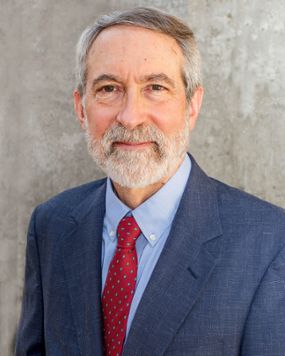
Conner, a professor in the Department of Plant Biology and a W.K. Kellogg Biological Station (KBS) faculty member, is an internationally recognized expert in plant ecology and evolution, specifically the role of natural selection on species adaptation in a changing or variable environment, the speed of evolutionary change in natural populations, and the various constraints on the course or outcomes of evolution. Additionally, Conner has performed seminal work on the role of floral traits on fitness in wild radish, an agricultural weed, and on milkweed, the host of the iconic monarch butterfly. He has also studied the impact of herbivory on the interactions of plants with their pollinators.
Conner has 90 publications, including a premiere textbook on ecological genetics, “A Primer of Ecological Genetics.” He has held editorships at eight journals, reviewed manuscripts for more than 30 journals, and served on multiple national and international grant review panels.
Conner is an exceptional professional guide, with 24 graduate students and postdoctoral research associates mentored in his lab, along with more than 200 undergraduates; 25 of these undergraduates were from underrepresented minority groups and seven of these 25 now hold a Ph.D. in a STEM field. Dr. Conner has served on 47 graduate committees. The College of Natural Science has recognized the excellence of Conner’s mentoring with its Outstanding Graduate Advisor Award (2003) and its Junior
Conner is dedicated to helping his academic community and has served as interim KBS director, has been a member of numerous department and college advisory committees, and has served on many faculty search committees. He has served the greater scientific community through leadership positions in the Ecological Society of America and as a fellow of the American Association for the Advancement of Science.
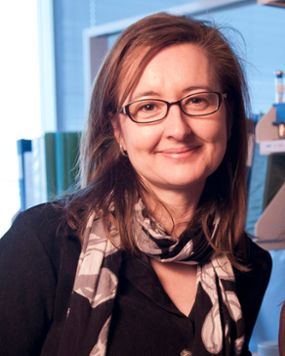
Reguera, a professor in the Department of Microbiology and Molecular Genetics, is an internationally recognized researcher, an outstanding educator, and a talented leader committed to numerous and varied service activities, including promoting women in science. An internationally recognized scholar in extracellular electron transfer and electrochemistry involving microorganisms, Reguera pioneered a new discipline in her field – electromicrobiology. She discovered that the bacterium, Geobacter sulfurreducens, made nanowires, which are used for long-distance electron transfer. While uncovering properties of this system, she exploited the novel process as a means to detoxify uranium in the soil.
Additional wide-ranging research projects by the Reguera laboratory include clarification of how microorganisms obtain energy by converting nitrate to ammonia and identifying which microorganisms compose the microbiome of the inner ear. Overall, her work has greatly enriched understanding of environmental microbiology and microbial physiology.
Reguera is a gifted teacher and mentor. She co-authored the textbook “Microbe”, which undergraduate students from around the world use regularly, teaches a highly regarded graduate course in microbial genetics, and served as instructor of anaerobic microbiology at two international venues.
In addition to her research, Reguera has contributed significantly to the broader scientific community, actively participating in professional societies and helping shape their vision for the future. She serves as a reviewer for governmental funding programs and an impressive array of journals, and as the editor-in-chief for the American Society for Microbiology’s journal, Applied and Environmental Microbiology. Reguera is sought out as a professional speaker nationally and internationally and has even helped educate the public about novel findings related to microorganisms by contributing insightful commentaries to the science blog, “Small Things Considered.”
Rounding out her impressive portfolio, Reguera participates significantly in a variety of service activities; she is particularly passionate about the promotion of gender equality and efforts to empower and advocate for professional women. She has participated in multiple panel discussions on how women can thrive in the tenure system and organized a session, “Women in Environmental Science,” at the 2019 annual meeting of the Society for Industrial Microbiology and Biotechnology.
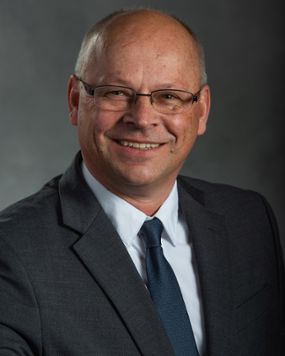
Tepe, a professor in the Department of Chemistry, conducts research that comprises an interdisciplinary blend of synthetic and medicinal chemistry that includes the total synthesis of natural products and the discovery of new reactions as well as the evaluation of natural products’ cellular mechanism and medicinal properties toward pressing needs in both cancer research and neurodegenerative diseases. His drug discovery program focuses on the discovery of innovative therapeutics to treat multiple myeloma. Other aspects of his research have addressed neurodegenerative diseases, including Alzheimer’s, Parkinson’s, and amyotrophic lateral sclerosis — or ALS. Tepe’s laboratory has developed small molecules to induce the degradation of the proteins that are hallmarks of those diseases.
Tepe’s research into the development of important and innovative chemical reactions to generate natural products, which can potentially serve as new therapeutic targets, has resulted in 75 peer-reviewed journal articles, 12 patents, and one commercial product. For his outstanding contributions, he received International Myeloma Foundation Awards in 2013 and 2019. He has also been a two-time winner of the Multiple Myeloma Research Foundation Senior Award (2008, 2010). The American Cancer Society named him one of its Research Scholars from 2003 to 2008. MSU’s College of Natural Science presented him with its Outstanding Faculty Award in 2021.
He is currently an editorial board member of Molecules and Mini-Reviews in Organic Chemistry. He has served as a member of 12 NIH study sections and has given more than 70 invited presentations at conferences and universities worldwide.
Tepe’s research has been continuously supported by external funding from NIH, the Multiple Myeloma Foundation, the International Myeloma Foundation, and the American Cancer Society.
He has taught more than 7,000 undergraduate and graduate students, consistently receiving scores of excellent in student evaluations. He has directed 17 Ph.D. and six M.S. students to graduation and served on more than 100 thesis and dissertation committees during his career. Additionally, Tepe has regularly welcomed the opportunity to discuss his research in presentations, workshops, and meetings with cancer patients, their families, and physicians, and has frequently interacted with Relay-for-Life organizers to help raise money to support multiple myeloma research.
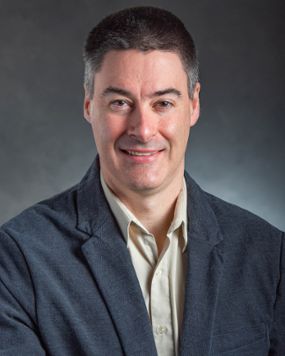
Waters, a professor in the Department of Microbiology and Molecular Genetics, is an exceptional researcher, educator, and mentor. His research ranges from increasing understanding of bacterial chemical signaling to developing novel technologies for biomedical applications. He explores chemical signaling in the human pathogen, Vibrio cholerae, to define the role of these molecules in bacterial pathogenesis. By disrupting their chemical signaling pathways, Waters is developing new strategies to control bacterial disease. The Waters laboratory also developed novel strategies to inhibit and eradicate bacteria growing in biofilms by identifying inhibitors of c-di-GMP synthases.
Waters has published more than 100 peer-reviewed articles covering a wide range of innovative and carefully dissected findings. To support his research, he has received grants from the National Institutes of Health; the National Science Foundation, including a prestigious CAREER Award; the American Diabetes Association; and several foundations and companies. Waters has presented 64 seminars at conferences and other institutions. He holds three patents.
Waters’s service to his profession is extensive. He typically peer-reviews approximately 25 manuscripts per year for Cell, eLife, Molecular Microbiology, Nucleic Acids Research, PLoS Biology, PLoS Genetics, PLoS Pathogens and PNAS. Additionally, he has served on the editorial boards for Molecular Microbiology and Frontiers in Cellular and Infection Microbiology, and currently serves on the editorial boards for the Journal of Bacteriology and Infection and Immunity.
Waters epitomizes the ideal role model and mentor, both as a classroom instructor and as a research mentor. He teaches one of the largest undergraduate microbial genetics courses in the world, with about 180 students annually. Within his laboratory, he has provided research opportunities to approximately 50 undergraduate students; MSU named him its Undergraduate Research Mentor of the Year in 2014. He has also mentored four postdoctoral scientists, 10 Ph.D. (or D.O.-Ph.D.) students, and two master’s students since 2008. Waters received the MSU College of Natural Science’s Teacher-Scholar Award in 2015.
Waters makes reaching out to the local community a priority. He led MSU’s Foldscope team in a local high school, the Microbial Magic station at the MSU science festival, and organized and led Microbiology Day at the Impression 5 Science Museum in Lansing, Michigan. Since 2012, Waters and his students have given presentations on bioluminescent bacteria and microbial life in ponds to elementary school students at School Science Nights.
In addition to the Beal award recipients, there were three other NatSci All-University award winners.
Marjorie Weber received a Teacher-Scholar Award, which is awarded to faculty who, early in their careers, have earned the respect of students and colleagues for their devotion to and skill in teaching, and whose instruction is linked to and informed by their research and creative activities.
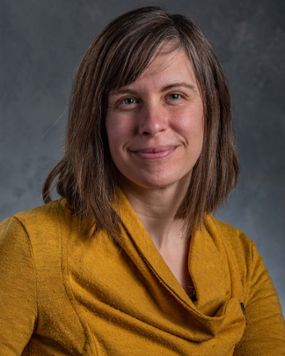
Weber a professor in the Department of Plant Biology, is an evolutionary ecologist who understands the social science theories of how people learn and applies them to the instruction and activities she creates in all her courses, creating classroom environments and student activities that foster interactive, inquiry-based learning and peer instruction.
Weber’s commitment to exemplary student instruction was central to the development of an excellent graduate curriculum in quantitative methods for the Ecology, Evolution and Behavior Program, in which she also teaches. Through this curriculum, students develop a robust quantitative and programing toolbox that empowers them as graduate students and in their careers. She is also an exceptional mentor. Two of Weber’s postdocs have been awarded prestigious fellowships from the National Science Foundation and six of her students and postdocs have published papers in prominent peer-reviewed journals.
Weber has a deep desire to enhance diversity, equity, and inclusion in STEM, leading her to develop Project Biodiversify, a worldwide project that houses teaching materials and methods aimed at enhancing human diversity and inclusivity in biology courses. For this work, Weber was awarded MSU’s Excellence in Diversity award and has developed an international following of instructors that utilize the project’s methods and workshops.
Weber’s research focuses on understanding the role of species interactions for the diversity of life on Earth. She has published more than 30 field-defining reviews and empirical studies in top journals and was awarded a major Dimensions of Biodiversity grant from the National Science Foundation to support her research. Weber also received the highest research honor in her field when named an Ecological Society of America Early Career Fellow for 2018-2023.
Weber is the lead principal investigator on a multi-institution NSF grant, “Improving Undergraduate STEM Education,” aimed at understanding the impact of scientist role models on student performance and interest in quantitative learning. This project integrates Weber’s passions for teaching, research, and inclusivity through a nationwide program diversifying and humanizing scientist role models in classrooms across the country.
Nicholas Rekuski received an Excellence-in-Teaching Citation, which is awarded to graduate teaching assistants who have distinguished themselves by the care they have given and the skill they have shown in meeting their classroom responsibilities. The awards are supported by the Office of University Development.
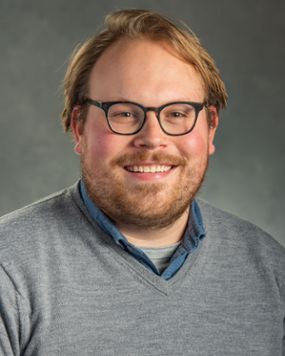
Rekuski, a graduate student in the Department of Mathematics, is an outstanding teacher dedicated to improving undergraduate mathematics education, putting student engagement at the forefront of his teaching to create inclusive, engaging experiences. His classes are filled with self-discovery activities that are inspired by real-life applications in mathematics. He aims to relate to his students from all backgrounds, promoting an inclusive environment where students can make mistakes and learn without judgement.
To help make math relevant for students in his “Quantitative Literacy I (Including Applications to Health and Risk)” class, for example, Rekuski created many of the class recitation materials, including a lab on calculating the probability of pregnancy with certain contraceptive methods and then interpreting medical test results. Such activities allowed students to use their mathematical skills in their own life experiences, making it instantly relevant for them.
Rekuski has been a key contributor to department curriculum development, far beyond what is expected or generally accomplished by teaching assistants. In addition to his contributions in the development of the “Quantitative Literacy” courses, he developed materials for “Transitions: Introduction to Mathematical Reasoning” — the first upper-division course for math majors and a critical bridge toadvanced mathematics study — including group work-based lessons and original homework sets. His most recent contribution to this class was the development of lecture videos to help the transition to online teaching.
Outside the classroom, Rekuski has been a valuable leader in the mathematics teaching community. He has mentored novice instructors, working closely with the Center for Instructional Mentoring to provide instructional support for new math teachers; supervised the Math Learning Center; coordinated grading sessions; and led large exam review sessions.
Rekuski is an excellent researcher who explores algebraic geometry, using tools from abstract algebra to understand solutions to polynomial equations, focusing specifically on understanding vector bundles in solutions to polynomials. Broadly, this has important applications in physics, cryptography, and machine vision.

Victor DiRita, Rudolph Hugh Professor and chair of the Department of Microbiology and Molecular Genetics, received the Simmons Chivukula Award for Academic Leadership for exemplary work in academic leadership at the ranks of: department chair, school director, assistant dean, or associate dean.
DiRita exhibits extensive leadership qualities, serving his department and the college both seriously and with good humor. He supports everyone without exception—staff, undergraduate and graduate students, postdocs, and faculty — while emphasizing and encouraging continuous learning and improvement throughout the department.
Numerous examples illustrate how DiRita treats others with tact, dignity, respect, and compassion. He has an open-door policy that welcomes everyone and ensures that all faculty, staff, postdocs, and students know they are equally important. Both faculty and staff note that DiRita not only listens to individual concerns—but hears them, understanding and empathizing with faculty and staff from their perspectives, rather than simply from his own view.
His compassion for individuals has been particularly evident during the COVID-19 period and with the challenges it has incurred. He has carefully considered and empathized with faculty and staff, especially those with young children who have been negatively affected by the pandemic.
DiRita strives to treat all faculty, whether primarily research or primarily teaching, as equals. When he realized that the annual review form had been developed based on standards for research faculty and therefore subjected teaching faculty to second-class status, he worked with the faculty advisory committee to develop a second annual review form. Its implementation has been highly successful in recognizing and rewarding the value of departmental teaching faculty.
At the graduate student level, DiRita demonstrates his respect to individuals by distributing a department-wide email just prior to a student’s dissertation defense that summarizes their accomplishments and future plans. This effort has greatly increased attendance at dissertation defenses, enhancing students’ confidence. Further, to help empower the success and development of graduate students and postdoctoral researchers, Dr. DiRita initiated Work-in-Progress Seminars WiPS, a weekly program of two 25-minute presentations by graduate students or postdocs.
DiRita also empowers the departmental staff and faculty, encouraging the departmental awards committee to nominate deserving staff and faculty for university and extramural awards.
Knowing that a department’s mood is influenced from the top down, DiRita is always positive, quick to praise others and highlight their successes. His attitude helps faculty members feel more affirmative, which then encourages staff and students.
For more information on this year’s awards and a complete list of award recipients, visit the MSUToday story.
Banner image: Six Michigan State University College of Natural Science (NatSci) faculty members and one graduate student have received 2020-2021 All-University Awards in recognition of their outstanding contributions to education and research. The NatSci recipients are: Jeffrey Conner, Victor DiRita, Gemma Reguera, Nicholas Rekuski, Jetze Tepe, Christopher Waters and Marjorie Weber.